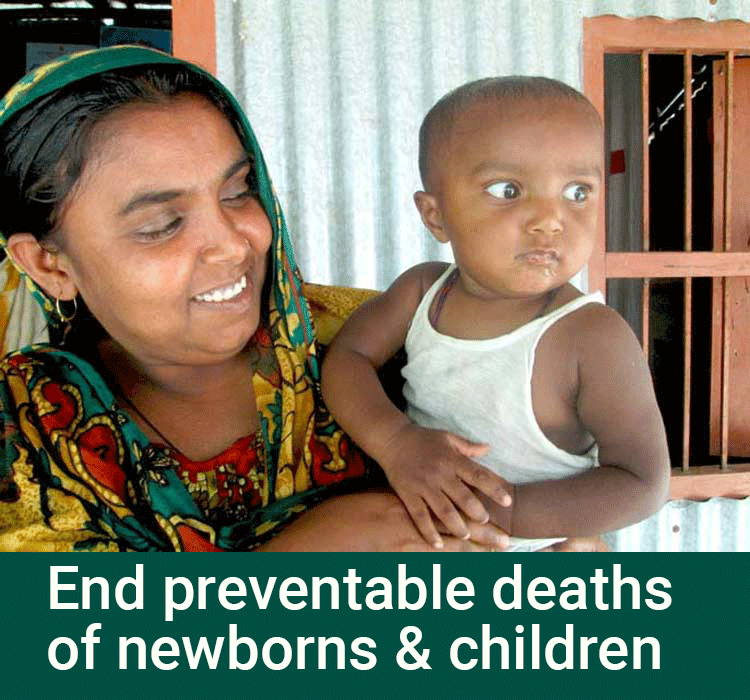
Context of maternal health
Reduction of maternal mortality rate is one of the most important health goals of the government of Bangladesh. The present rate of maternal mortality is 194 per 100,000 live births showing that Bangladesh could not achieve the MDG target of 143 per 100,000 live births by 2015. However, the decline in MMR from 322 in 2001 to 194 in 2010, a 40 percent decline in nine years was significant achievement. Now t
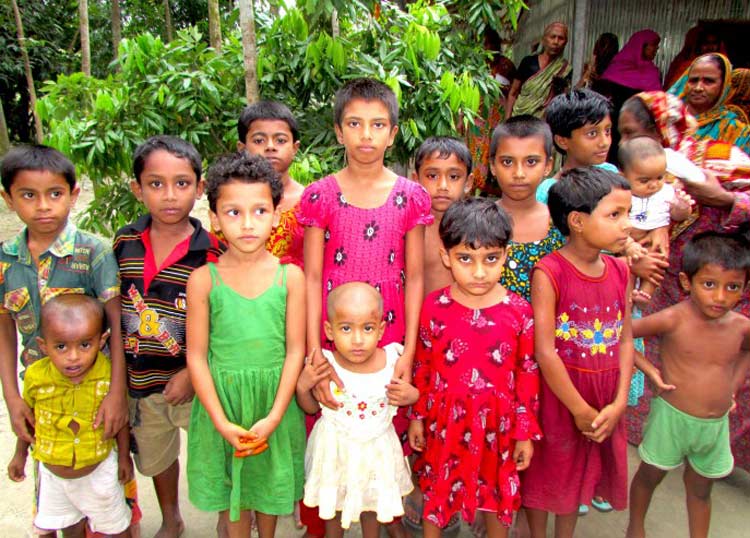
An initiative of UBINIG with rural healthcare providers
Introduction
Despite significant efforts in maternal health care by the government and the NGOs, Bangladesh continues to remain high among the countries having high maternal mortality rate. The present rate of maternal mortality is 194 per 100,000 live births showing that Bangladesh could not achieve the MDG target of 143 per 100,000 live births by 2015. However, the decl
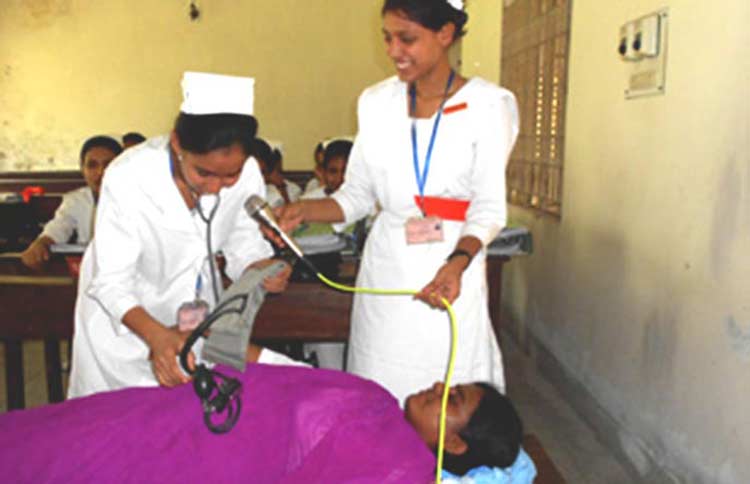
WHO has compiled the vital statistics for maternal and perinatal health for South East Asia region. For Bangladesh the annual number of births is 3.5 million and annual number of maternal deaths is 5,200 as of 2013. The maternal mortality ratio is 170 per 100,000 live births. About 71% of babies are delivered at home, 11.8% in public hospitals and 15.1% in private hospitals . In terms of services providers only 21% are qualified doctors, 6.1% are nurse, midwife and auxillary nurse, and the ma
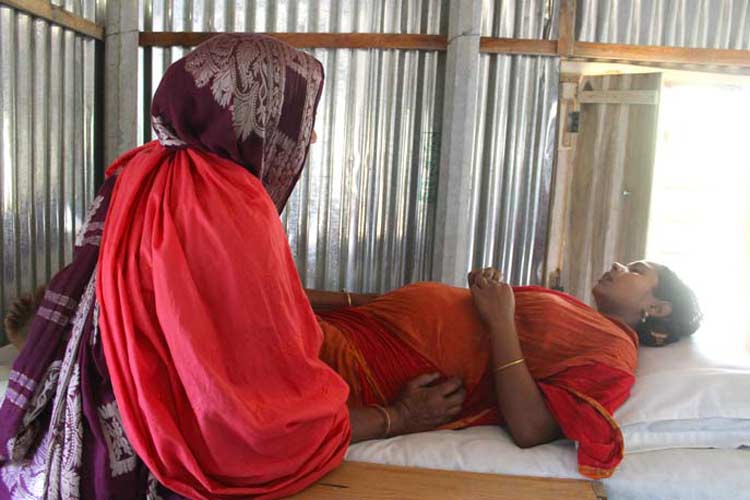
Daighors are the centers run by Traditional Birth Attendants (locally known as Dai Mas) to provide advisory and referral services to women and young girls. They ensure care and monitoring of pregnant women, the new borne and children (mostly under 5). These Dais live in the community and interact with women very intimately and take care of them for their health and most importantly through properly advised food to fulfill specific nutritional deficiencies or to ensure nutritious food that are
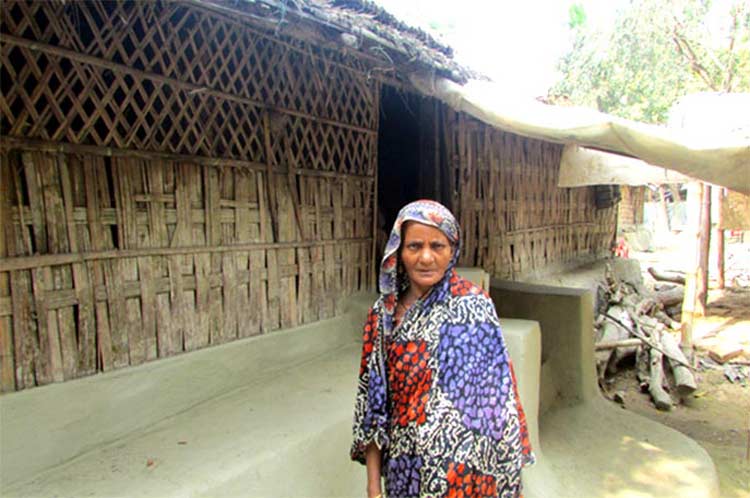
Dai Ma Hosneara Begum in front of her house
Emergency Support to Flood Affected People. Period: August December 2015; Supported By: Primate’s World Relief & Development Fund
The Daimas must run to the call of pregnant mothers as fast as the healers rush to the spot to snake bite victims’. This statement of Hosne Ara Begum (52) is indicative of the fact that how much the Daimas are conscious of their responsi
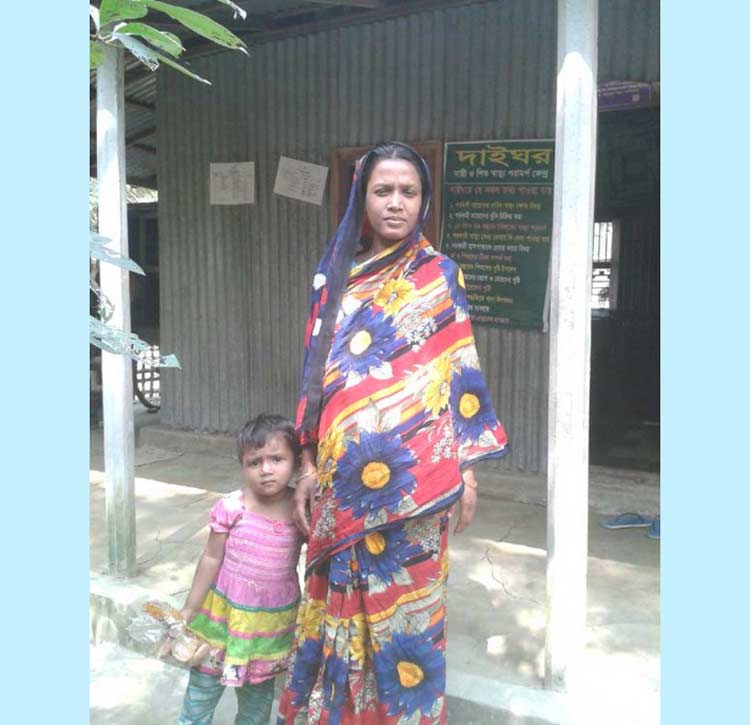
Pregnant mother Hadisa begum. Happy to get service from Dai ghor
Emergency Support to Flood Affected People. Period: August December 2015; Supported By: Primate’s World Relief & Development Fund
Hadisa Begum (24), wife of Amin Uddin (32), village: Demushiapara, union: Badarkhali, Upazila: chakaria, district: Cox’sbazar is a flood victim. She was married five years ago. She had a daughter aged three years fou
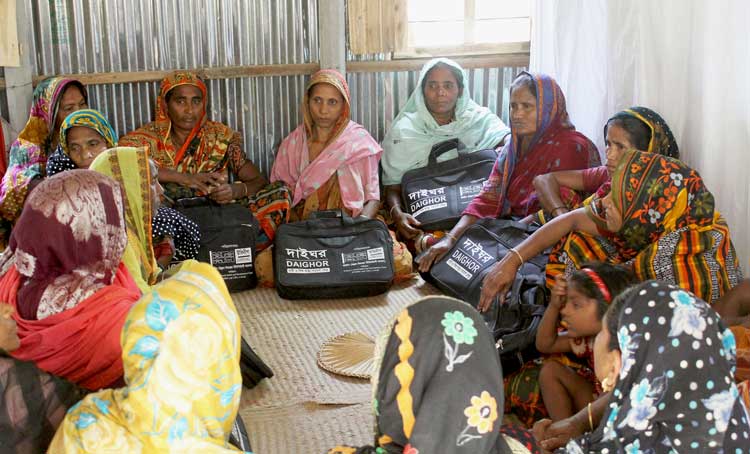
Introduction
In response to the demands of the Dais attending the Dai conference along with women healers and women farmers organized during 7-9 December 2006 the Dai kit-distribution was undertaken by Narigrantha Prabartana with Support from Action Aid Bangladesh from Advancing Women’s Rights theme. This is the Interim Report for the project which includes completion report on kit distribution.
UBINIG from its rural ce
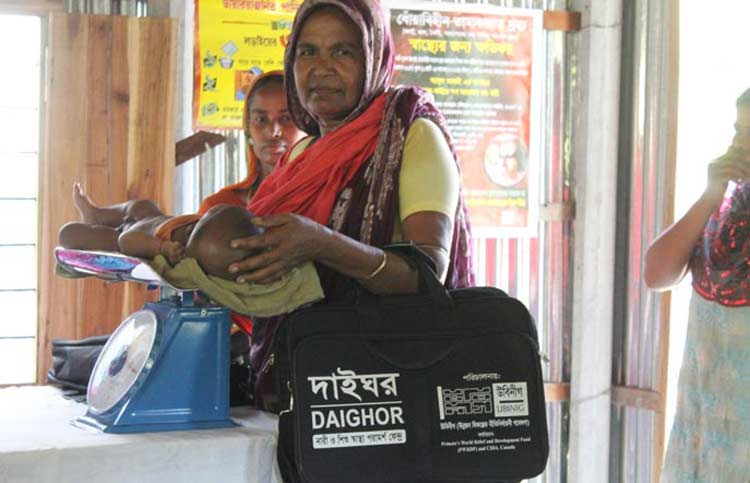
Background
The government of Bangladesh has a goal to reduce Maternal Mortality ratio to 143 per 100,000 live births by 2015 in order to achieve the MDG 5 by 2015. So far the decline is 194 per 100,000 (as of 2010) showing a good trend of decline to be able to reach the goal by 2015.
Maternal causes account for 14% of all the causes of deaths among women of reproductive age. According to Bangladesh Maternal Mortality Survey
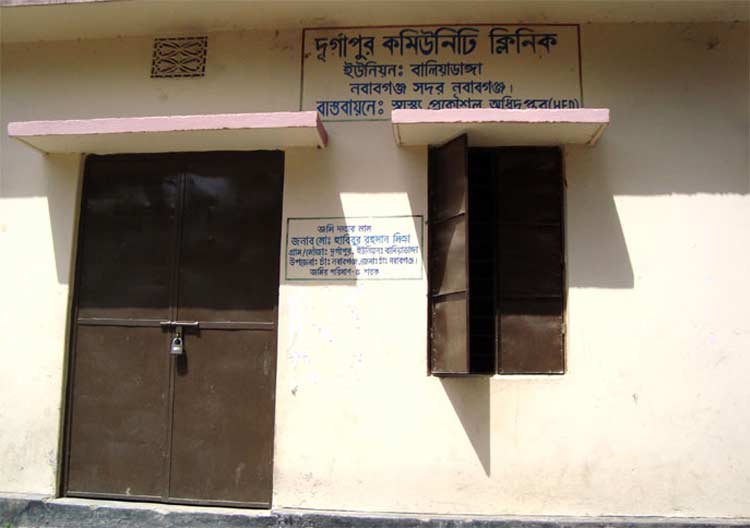
I have been visiting some upazilla and Union health care centres in different areas specially in the districts of Cox’sbazar, Bandarban, Tangail, Kushtia, Chapainababganj and Brahmanbaria during last two months. It is nice to see that the buildings are well constructed and have all the potentials for increasing the facilities to provide services to the people. They are well located in terms of road communication. My main purpose was to see if women and children can receive services for
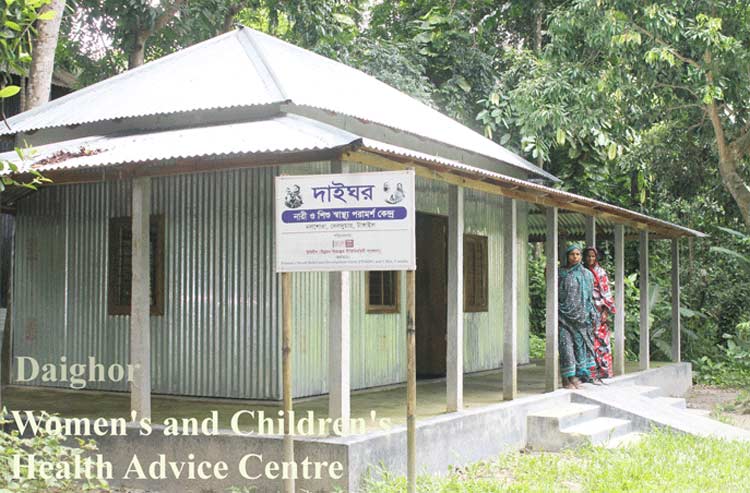
In early 2012, UBINIG took an initiative for improving access of maternal and child health to the government health service delivery system. For this purpose, UBINIG selected 130 villages in 23 Upazila under 15 districts, where the women of reproductive age, pregnant women and children under 5 (U5) had very little access to government health service delivery system. UBINIG also identified various reasons for poor access including transport, non-availability of health professionals and as wome
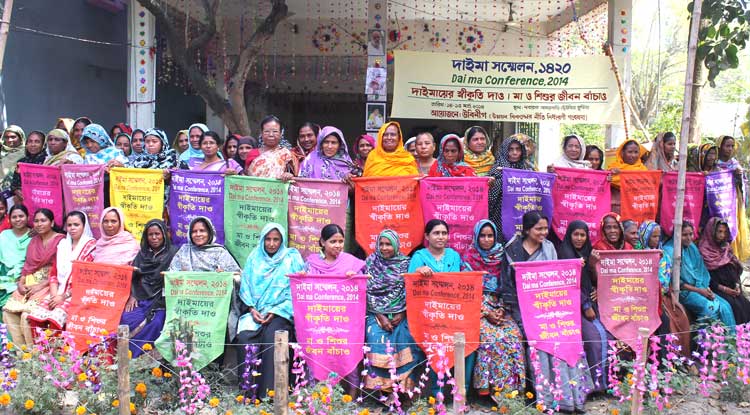
Dais (Traditional Birth Attendants)) have renewed their commitment towards their responsibilities to ensure care for mother and child health in their respective communities. Dai representatives from 22 Upazilas in 14 districts gathered in Kushtia prior to Lalon Dol Festival to attend in Dai Conference 2014. It was a two day long conference and over 200 Dais and people from different social groups joined there.
Dr. Md. Mustafizur Rahman, the Civil Surgeon of Kushtia inaugurated Dai Con
স্থানীয় জাতের বেগুন রক্ষা করুন
প্রতিবাদ ও দুনিয়ার সেরা বিজ্ঞানীদের সাবধান বাণী উপেক্ষা করে ক্ষতিকর বিটিবেগুন বা বিকৃত বেগুনের জাত বাংলাদেশে প্রবর্তন ও বাজারজাতের অপপ্রয়াস চলছে। বেগুন গাছে মাটীর ব্যাক্টেরিয়ার জিন ঢুকিয়ে পুরা বেগুন গাছকেই বিষাক্ত করা হয়। সেই গাছ ফল আর ডগা ছিদ্রকারী পোকা খেলে মরে যায়, কিন্তু বিষাক্ত বেগুন মানুষ খেলে ক্ষতি হয় না, এই হচ্ছে বৈজ্ঞানিক দাবি।
কী দরকার? কারন সারা দুনিয়ায় বেগুনের বিলিয়ন ডলার ব্যবসা। মার্কিন বহুজাতিক কম্পানি মনসান্টো ও ভারতীয় কোম্পানি মাহিকো তা তাদের একচেটিয়া নিয়ন্ত্রণে নিতে চায়। এর কারিগরি দিকের মালিকানাও তাদের। বাংলাদেশের বেগুনের ওপর এই কারিগরি খাটীয়ে তার ওপর বুদ্ধিবৃত্তিক মালিকানা দাবি করছে তারা। অন্য দিনে বাংলাদেশের স্থানীয় বেগুন ধ্বংস করে শুধু কম্পানির বেগুন আমাদের খাওয়াতে চায়। জীবন ও স্বাস্থ্যের ওপর যার সম্ভাব্য ঝুঁকি মারাত্মক হতে পারে।
বাংলাদেশের প্রাণবৈচিত্রের ওপর বহুজাতিক কম্পানির দখলদারির এই কৌশল প্রতিহত করতে হলে নিজেদের বেগুনের জাত চেনা ও রক্ষা করা জরুরী। এটা আমাদের সকলের সচেতনতা ছাড়া সম্ভব নয়। অতএব নিজেদের বেগুনের জাত সম্পর্কে জানুন, এবং নয়াকৃষি আন্দোলনের কৃষকদের সহায়তা করুন। এর বিরুদ্ধে লড়তে হলে নিজেদের জাত রক্ষা করার বিকল্প নাই।
প্রাণবৈচিত্রের উৎসভূমি (origin of diversity) হিসাবে বাংলাদেশ বেগুনের বৈচিত্র্যের দিক থেকে দুনিয়ার যে কোন দেশের চেয়ে সেরা। বেগুনের আন্তর্জাতিক বাজার বিশাল, কারণ সব্জির মধ্যে বেগুন সুস্বাদু এবং এর মধ্যে তেল (fat) নাই বললেই চলে। তার মানে বাংলাদেশের অর্থনৈতিক সমৃদ্ধি নিশ্চিত করবার জন্যও আমাদের দেশি জাতের বেগুন রক্ষা করতে হবে।
নয়াকৃষি আন্দোলন যে সব বেগুন নিয়মিত চাষ করে তার কিছু ছবি এখানে দেওয়া হোল।
Protest Against Btbrinjal Continues
SUPPORT PEOPLE"S PROTEST AGAINST BtBRINJAL
Pictures of rallies and protests against Btbrinjal. Farmers, scientists, environmentalists, ecologists, lawyers, teachers and consumers have been protesting agaginst Btbrinjal since
Bangladesh Agriculture Research Institute (BARI) was trying to get approval from the government for cultivation and commercial release based on inadequate, incomplete and unethical research practice. GMO promoters Undermined strict adherece of 'preacuationeruy principle' during field trial necessery to protect environment and all life forms including human beings from potential environmental and health effects of the genetically modified crops.
UBINIG Centre (BIDDAGHORS)
Nayakrishi centers in the districts of Tangail, Pabna, Cox’s Bazar, Kushtia.
Introducing Dai Mas (Traditional Birth Attendants)
Introducing key leaders of the rural health movement in Bangladesh.
Dai Ma (Traditional Birth Attendants) plays a major role in rural health systems particularly in maternal & child health and in the use and conservation of medicinal plants. UBINIG is working with them for a long time to develop a link with their practice with agro-ecological approach to health, medicine and nutrition led by Nayakrishi farming communities who practice biodiversity based ecological agriculture. Dai Mas are now organised into a network engaged in innovative knowledge practices and institutional experiments. This will enable them to contribute more effectively to national health system. They have strong grass root connections and effective social network. They are self-motivated and monitor the health of mother and child on their own as a responsible member of the community. Sense of responsibility come from their being woman and the natural instinct to help other women in child birth and child rearing. A command on indigenous knowledge and profound understanding of reproductive and child health make them unique in their role in the community. UBINIG is working with theme to find innovative and effective ways to link them with national health system.
Daighors (দাইঘর)
Translating Dai Mas as 'Traditioal Birth Attendants' misses the profound cultural, social and knowledge based practices of women in rural areas of Bangladesh. First, Dai Ma’s symbolises a social relationship. Her responsibility does not star during childbirth, rather when a woman comes as a bride in her village or locality. She is the main source of reproductive knowledge for women in reproductive age. In most cases, the Dai Ma is connected to the families of her in laws by helping in the birth of her husband. Dais are always married and have children, this is her acceptability as 'Dai' (birth attendant) in the village. She is the living medical and health record of the women in the village and without her a community health care system is almost impossible on which the national health care system has to rely on.
Glimpses from Nayakrishi Villages
Biodiversity-based ecological agriculture is note merely 'ORGANIC', but a unique practice without pesticide, chemicals and ground water extraction to achieve the highest systemic yield from per acre of farm land. Households are small ecological production units constituting a complex design encompassing the whole village. You can purchase the farmer's produce from Shashyshaprabartana.
Samples of UBINIG Posters
Posters express concerns and ideas. They are interesting materilas to read and listen as well participate in the issues one is committed. UBINIG regularly prints and shares posters as a way to build up networks and communications. Web through some examples posted here.
UBINIG PUBLICATIONS (ENGLISH)
UBINIG publications. To order please contact UBINIG (Policy Research for Development Alternative) 88 0178 001 1194 or`
Narigrantha Prabartana
6/8 Sir Syed Road, Mohammedpur, Dhaka -1207.
Phone: 880-2-9140812 . email: narigrantha@gmail.com
আমাদের বাংলা প্রকাশনা
উবিনীগ (উন্নয়ন বিকল্পের নীতি নির্ধারণী গবেষণা) থেকে প্রকাশিত গুরুত্বপূর্ণ বাংলা বইয়ের তালিকা। আরও জানার জন্য উবিনীগ অফিসে যোগাযোগ করুন (মোবাইল: ০১৭৮০০১১১৯৪)। বই সরবরাহ ও যোগাযোগের জন্য:
নারীগ্রন্থ প্রবর্তনা ৬/৮ স্যার সৈয়দ রোড, মোহাম্মদপুর, ঢাকা-১২০৭, বাংলাদেশ।
ফোন: ৮৮০-২-৯১৪০৮১২, মোবাইল: ০১৯৫ ৪৪৭৬০৬৪ । ই-মেইল: narigrantha@gmail.com











